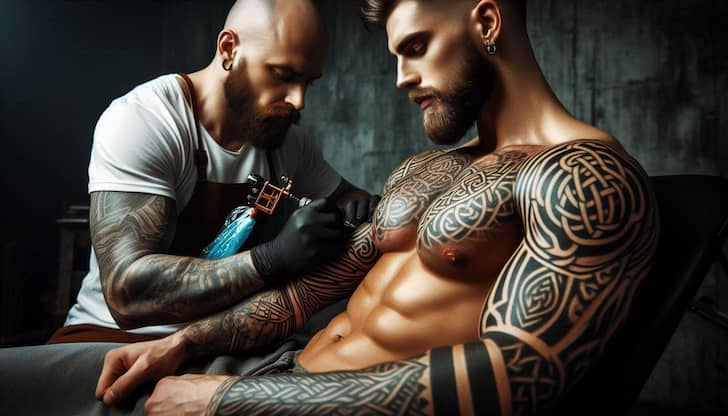You expect pain when getting a tattoo, but nobody warns you about the sudden drop in body temperature. Shivering in the tattoo chair feels unnatural, yet it happens almost every time. Your skin burns, your brain spins, and then the chills hit like an uninvited guest at your own party. Instead of feeling like a badass, you start wondering if your body just caught the flu from an ink needle.
Ink and the Immune System's Overreaction
Your immune system panics the second the tattoo needle breaks the skin. White blood cells rush in like overprotective parents, treating ink like an invasion. This reaction leaves you exhausted, feverish, and wondering if you made a terrible mistake. Your body doesn’t care about art—it thinks it’s fighting off an infection.
- Shivering kicks in because your body misreads the situation. Your immune system sees tattoo ink as an intruder. That’s why getting inked feels like an endurance test. Inflammation and temperature swings make everything worse.
- Fatigue wipes you out like a bad hangover. Your immune response drains energy faster than you expect. That’s why you feel completely wiped after a long session. Your body steals all its resources to handle the ink assault.
- Sweats and chills play tag with your body. The stress of tattooing confuses your internal temperature regulation. That’s why you feel feverish one second and freezing the next. Your body keeps flipping between extremes.
- Pain perception gets thrown into the mix for fun. Your immune system alters pain sensitivity. That’s why the tattoo hurts more as exhaustion sets in. Your body piles on discomfort just to mess with you.
Blood Sugar, Adrenaline, and Tattoo Shakes
Your blood sugar crashes the longer your session lasts. Your body burns through glucose trying to manage pain and stress. Adrenaline steps in for a while, but when it wears off, you’re left dizzy and shaky. Skipping a meal before tattooing is a rookie mistake that guarantees disaster.
- Hunger sneaks up and ruins everything. Your body burns energy faster than you realize. That’s why skipping food before a tattoo leads straight to dizziness. Your body needs fuel to keep up.
- Tattoo shakes hit when adrenaline runs out. Pain triggers an adrenaline boost, but it doesn’t last forever. That’s why you end up trembling mid-session. The crash leaves you weak and unsteady.
- Sweating gets out of control, even if the room is cold. Stress forces your body to sweat no matter the temperature. That’s why tattoo shops feel colder once the session starts. Sweat cools your skin, making chills worse.
- A sugar boost fixes everything. A snack before or during the session keeps energy levels steady. That’s why tattoo artists recommend eating first. Your body needs sugar to avoid cold sweats and dizziness.
Nerve Shock and Sensory Overload
Your nervous system treats tattooing like trauma. Thousands of tiny needle pricks overwhelm your pain receptors, sending mixed signals to your brain. Temperature regulation gets thrown off, making you feel even colder. Even wrapped in a blanket, you shiver like you’re stranded in a blizzard.
- Pain signals hijack your body’s priorities. Your brain focuses on tattoo pain instead of regulating temperature. That’s why you feel cold even under a thick hoodie. Your body misplaces its attention.
- Sensory confusion takes over. Your brain struggles to process both pain and cold. That’s why tattoo chills feel worse than normal shivering. Your nervous system can’t decide what’s happening.
- The tattooed area burns while the rest of you freezes. Inflammation heats your skin, but your nervous system exaggerates cold sensations elsewhere. That’s why tattoo flu feels like both fever and frostbite. Your body just throws everything at you.
- A warm drink works better than logic. Holding a hot beverage convinces your nervous system to relax. That’s why sipping tea or coffee during a break helps. Your brain stops overreacting to cold signals.
The Psychological Toll of Tattoo Flu
Your brain starts acting weird when exhaustion takes over. Long tattoo sessions mess with your perception of time, pain, and reality. The cold, the fatigue, and the sensory overload create something surreal. You might walk in excited and leave questioning if you even exist.
- Time stretches and feels like a fever dream. Your brain struggles to handle pain and exhaustion at the same time. That’s why sessions feel like they last forever. Your mind distorts reality to make suffering feel longer.
- Mild hallucinations creep in when exhaustion peaks. Low blood sugar, pain, and stress can trigger weird effects. That explains why some people hear voices or see strange shapes. Your mind fights to stay conscious.
- Mood swings smack you in the face. The adrenaline crash creates emotional whiplash. That’s why you feel euphoric one minute and miserable the next. Your brain cycles through emotions at full speed.
- Post-tattoo euphoria makes you forget everything. The second the needle stops, everything feels perfect. That’s why you immediately want another tattoo despite the pain. Your brain rewards survival with a rush of relief chemicals.
How to Survive the Tattoo Flu Like a Pro
Tattoo flu isn’t inevitable, but bad preparation makes it worse. If you fuel up, stay warm, and know what’s coming, you’ll suffer less. Your body still reacts, but at least you won’t feel like you’re dying in the process.
- Eat real food before your session. Food stabilizes blood sugar and prevents an adrenaline crash. That’s why skipping meals leads to regret. Your body needs energy to get through the session.
- Layer up like a paranoid survivalist. Staying warm reduces the intensity of tattoo chills. That’s why people who dress lightly end up shaking. Your body needs external warmth when its own system fails.
- Take breaks, even if you don’t think you need them. Short pauses prevent exhaustion from taking over. That’s why pacing yourself helps with endurance. Your body handles stress better in manageable chunks.
- Hydrate like you’re running a marathon. Water helps regulate temperature and prevents dehydration. That’s why dry mouths and dizziness hit during long sessions. Your body needs fluids to function properly.
- Plan for post-tattoo recovery. The experience doesn’t end when the needle stops. That’s why eating, resting, and staying warm afterward matter. Your body treats tattoo healing like recovering from an illness.
Inked and Freezing, But Still Worth It
Tattoo flu sounds like absolute misery, but nobody quits over a few chills. The cold, the exhaustion, and the adrenaline crashes all fade, leaving only the art behind. Every session rewires your body into survival mode, yet you keep coming back for more. The suffering lasts a day, but the ink lasts forever—so maybe your body just needs to get over it.





Yep, tattoo flu is real. Every time I get a big piece done, my body feels like it’s been through a marathon.
It’s crazy how something as simple as getting inked can leave you feeling exhausted and under the weather. The part about the immune system being activated makes total sense—I’ve definitely experienced the chills and fatigue after long sessions. Staying hydrated and eating well before and after makes a big difference, though. I also try to schedule my appointments on days when I can rest afterward. Glad to see more people talking about this because it’s something a lot of artists and clients brush off as normal.
Thank you for your comment Alex.
Thank you for your post. I just got my first tattoo last week, and I had NO idea this was a thing. Cos I thought I was coming down with something cos I felt real achy, got tired the next day. Your really puts things into perspective so thank you.
I never really thought that my immune system was reacting to the ink like a wound… makes total sense now. Wish I had known about this before because I might have planned my appointment differently. But thank god it wasn’t too bad, just a little rougher than I expected. Next time I’ll be sure to hydrate more and maybe take some vitamins beforehand. Thanks for the insight.
Thank you for your comment Nan, hope all is going to be well.
I'm a tattoo artist and I’ve had so many clients tell me they feel sick after long sessions, and this article breaks down why in a way that’s really easy to understand. I don't tell clients this but the truth is getting a tattoo is a trauma to the skin but not everyone realizes that it can affect their whole body. I do emphasize aftercare like you said though. hydration, rest…and proper nutrition go a long way. I schedule breaks during long sessions so clients don’t get too drained. More people should know about this because a little preparation can make the whole experience way smoother.
Thanks for your advice, we appreciate it.